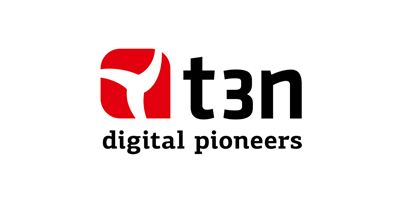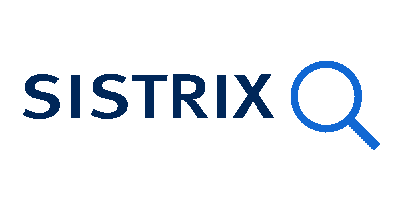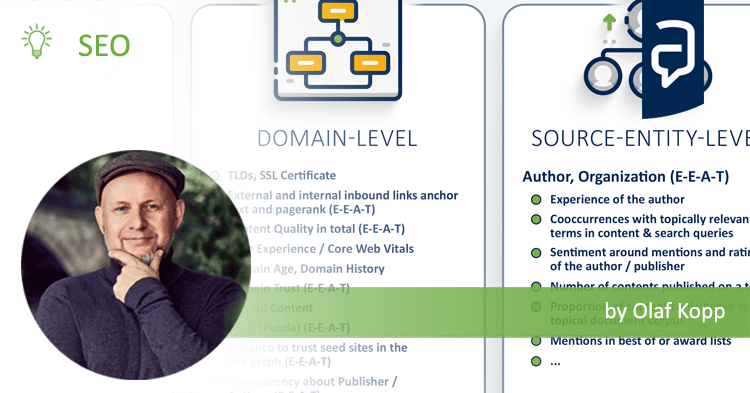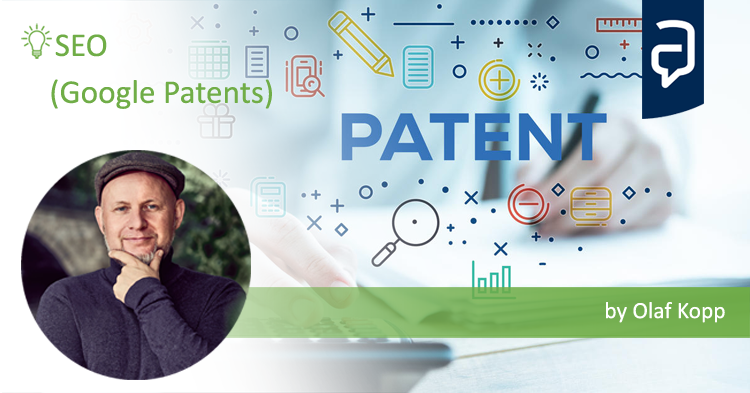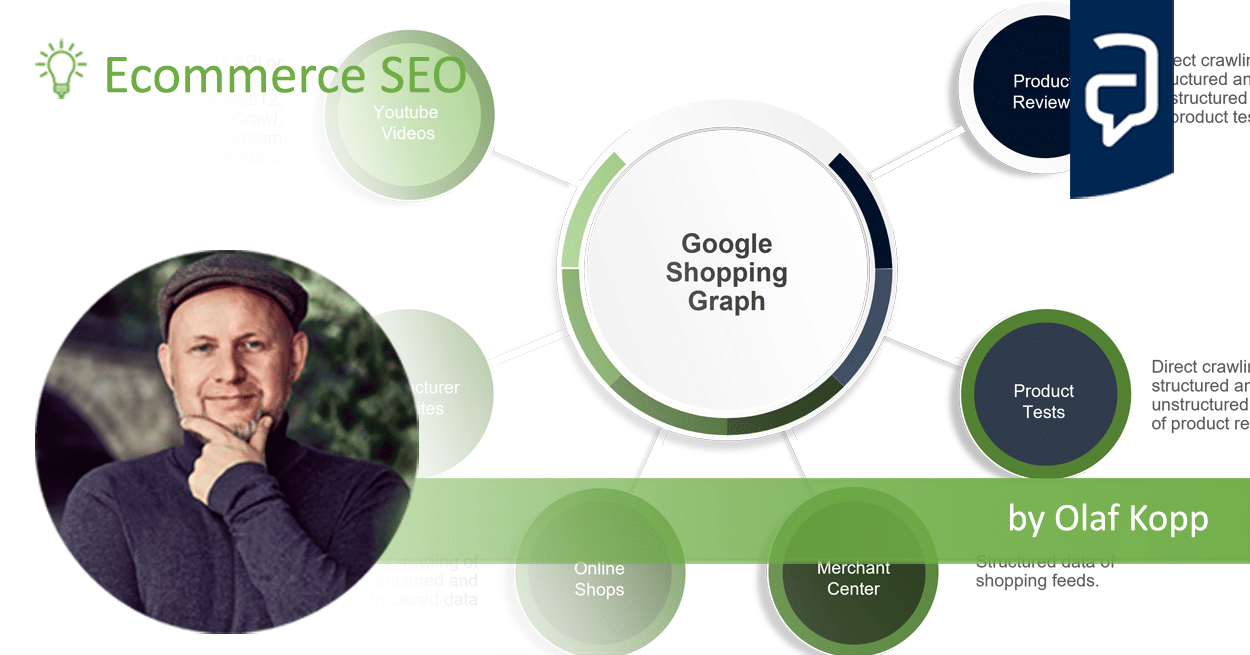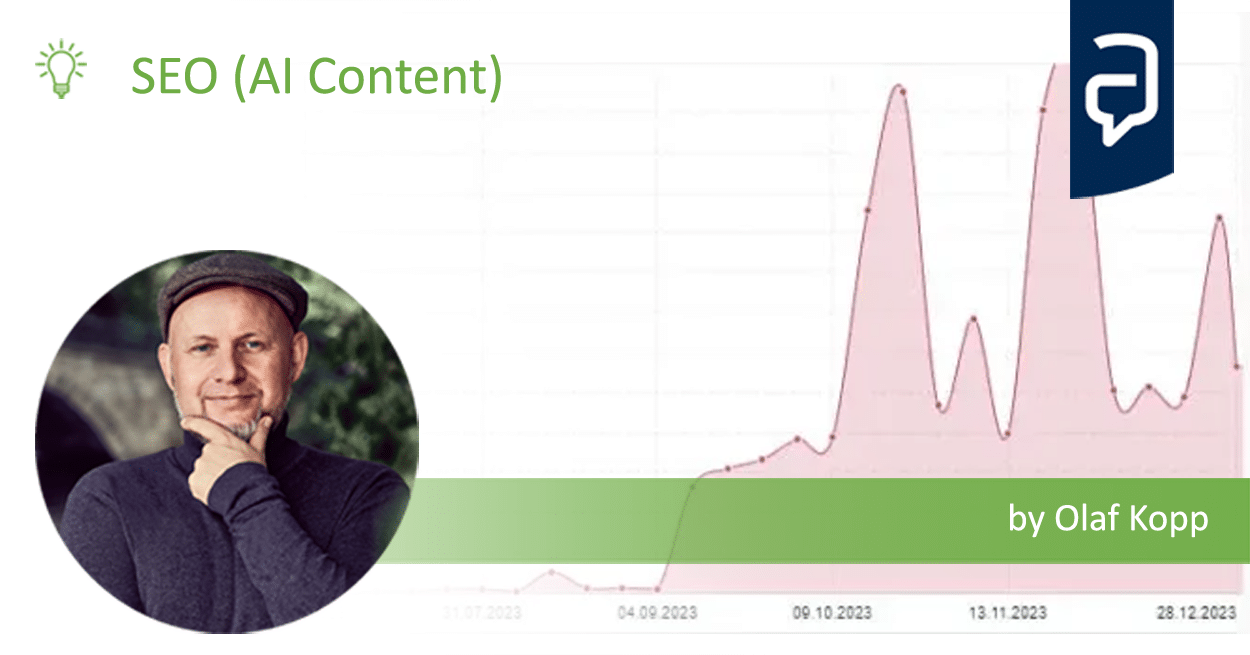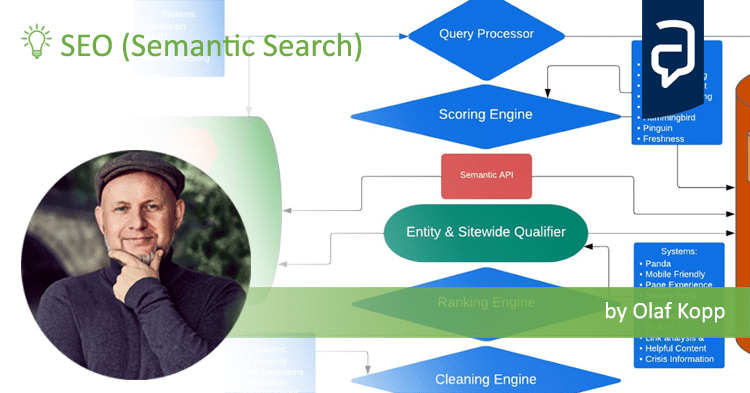Knowledge Panels & SERPs for ambiguous search queries
A major challenge for Google is the delivery of knowledge panels and SERPs for search queries related to ambiguous entities. In this post, I would like to discuss how Google can master this task.
Contents
- 1 The role of the resultscore in the Knowledge Graph
- 2 Personalization of search results in case of ambiguous entities in the search query
- 3 Thematic context for search queries with reference to named entities
- 4 Google patents on the subject
- 5 Autocompletion using previously submitted query data
- 6 Identifying teachable moments for contextual search
- 7 Conclusion: what can SEOs learn from this?
The role of the resultscore in the Knowledge Graph
An interesting metric is the resultscore. You can query the result score of an entity for a specific entity-related search term using the Knowledge Graph API.


The value describes how well an entity matches e.g. an entity-based search. This score is not a fixed value. It changes continuously. On what basis Google determines this score is unclear. It may be related to the popularity of the entities and/or the frequency of mentions in the respective thematic contexts or co-occurrences.
The car manufacturer Jaguar has with 138 a significantly higher result score than the animal with 70 This has the consequence that firstly in the SERPs almost exclusively search results as well as the knowledge panel are displayed only for the car brand.
Here you can see that information from the Knowledge Graph can also have an influence on the ranking of the normal search results.

The entity with the highest results score often occupies the classic knowledge panel first.
However, the results score does not always seem to be decisive for which entity Google delivers the knowledge panel. In the example for the query, the entity “jacksonville jaguars” got the highest resultscore.

The following meanings, entity types and results scores are recorded in the Knowledge Graph:
Despite the lower Resultscore, the car manufacturer is prominent output as the Knowledge Panel. There seem to be other criteria besides the resultscore for which entity a knowledge panel is served.
It could be that the Jackson Ville Jaguars do not have an international reputation like the animal or the car manufacturer. Knowledge Panel, unlike the business boxes, do not take into account regional circumstances. This could be a reason. In addition, it would be possible that the entity type “car manufacturer” is more important than the entity type sportsteam. In general, it seems that certain entity types are favored to be output as the prominent Knowledge Panel.
If Google is not sure which entity is searched for, in addition to the knowledge panel, other small optional “specification boxes” with further meanings are displayed. Google wants to find out if you are searching for another entity.

When you click on this box, the search query is rewritten to deliver more appropriate search results.

Personalization of search results in case of ambiguous entities in the search query
In 2018, however, there were some clear statements from Google about the level of personalization in SERPs. According to this, personalization is limited to the following factors:
- The location
- The language
- The time
- The platform used
- The distribution to different data centers


Other factors such as click-through rate, past searches, and other user signals were not confirmed or denied. I know from my own experience that between 2012 and 2018, for example, the click-through rate on a search result was a clear factor in the fact that when the same search query was entered again, the previously clicked search result was placed significantly more prominently in the SERPs. To this end, I must emphasize here. Personalization is about a user-related individual ranking and not about a general scoring of certain content.
However, I can no longer see a clear influence on my personal search results, which confirms Google’s statements.
Thematic context for search queries with reference to named entities
The situation is somewhat different for search queries that have a reference to entities. Here, the search history, i.e. search queries made in the past with reference to the respective entity, plays a role, as the following tests show. I have only been able to map this test in the German SERPs so far.
I searched for Leibniz in the first attempt. This resulted in the following picture:

The entity name is ambiguous. So could be meant:
- The philosopher Gottfried Wilhelm Leibniz
- The Leibniz University in Hannover
- The Leibniz cookie from Bahlsen
- IFO-Leibniz Institute in Munich
- Leibniz Association
- various songs and books
Google has to decide at the first search query related to this entity to which of these entities search results should be delivered. Google lacks the context here so far and so results of the most probable entities are delivered. Google determines the probability on the resultscore from the Knowledge Graph API and already existing information about the user.
In this case, the philosopher has the highest resultscore.
- The philosopher Gottfried Wilhelm Leibniz (resultscore: 2316.544189453125)
- IFO-Leibniz Institute in Munich (resultscore: 185.78216552734381)
- The Leibniz Biscuit from Bahlsen (resultscore: 117.6958465576172)
- Leibniz Association (resultscore: 64.970230102539062)
So for the first query the meaning of the philosopher get the prominent knowledge panel.
Google will be able to determine the resultscores via e.g. the popularity of an entity as explained in the article How do Knowledge Panels & Knowledge Cards work? Google chooses the entity Leibniz University because of my location in Hannover.
As a second search query I executed “leibniz keks”. Here the entity can be clearly determined by Google.

It will be exciting if you click the little box below the main entity or enter “leibniz” again as the third session in a row.

There is no refinement of the query, but a significant change in the search results and the Knowledge Panel. The Context of the search has switched based on the search session history.
Due to the changed thematic context from the previous search query, Google is no longer sure whether I really mean the philosopher and exchanges position 1 in the SERPs according to the previous search query “leibniz keks”. In addition, Google also no longer delivers a unique knowledge panel, but gives me the option to refine the search query in the direction of the entities Leibniz cookie, philosopher and Leibniz association.
Ergo Google takes into account the location as well as the thematic context of previous user-related search queries. for the ranking and design of the SERPs.
Cindy Crum made some interesting inferences about sequential searches to better understand search intent. Check out this video.
Google patents on the subject
I found the following active Google patents on this topic:
Autocompletion using previously submitted query data
This Google patent is a bit older and was signed in 2009. It probably forms the basis in general for the autosuggest suggestions at Google.
“The methods include receiving query information at a server system. The query information includes a portion of a query from a search requestor. The methods also include obtaining a set of predicted queries relevant to the portion of the search requestor query based upon the portion of the query from the search requestor and data indicative of search requestor behavior relative to previously submitted queries. The methods also include providing the set of predicted queries to the search requestor. Other embodiments of this aspect include corresponding systems, apparatus and computer program products.”
According to the patent, Google accesses a set of other search queries that have a relationship to the currently submitted search query. These are then ranked based on searches made in advance by the user in question, and a few suggestions from this set are suggested as additions. In addition, click data, location-specific data, language-specific data, or other similar types of data can be added to the ranking to further understand the user’s context.
The following tasks can be performed by this method:
- A searcher continues to receive search suggestions before the requestor indicates completion of the query input.
- Additionally, information associated with the user’s (or users’) previous search queries (e.g., click data associated with search results) is collected. From the obtained query information and the previous search information, a set of predicted suggestions is created and presented to the user.

Identifying teachable moments for contextual search
 This patent was signed by Google in 2018 and granted in early 2020. The patent describes how Google, based on a series of consecutive search queries, identifies search patterns. These search patterns can be on identical entities and other semantically related terms. Based on the recognized pattern, Google can better identify the context of the user or the meaning of the search query more accurately and accordingly output better search results. The search results can relate to the current search query as well as previous search queries.
This patent was signed by Google in 2018 and granted in early 2020. The patent describes how Google, based on a series of consecutive search queries, identifies search patterns. These search patterns can be on identical entities and other semantically related terms. Based on the recognized pattern, Google can better identify the context of the user or the meaning of the search query more accurately and accordingly output better search results. The search results can relate to the current search query as well as previous search queries.
Some examples of possible patterns are given in the patent:
An example series of Searches may include [Obama White House], [Obama White House speech], and [Obama White House speech today]. In this example series of searches, entity terms may include “Obama” in the context of the primary entity “Barack Obama” and the secondary entity “President of the United States”, and “White House” in the context of the secondary entity “White House”. Non-entity terms “speech” and “today” are included in this example series. The pattern may be that the primary entity and secondary entities within the query series are consistent, e.g., associated with each query in the series, and that the non-entity terms within the query series are inconsistent.
Another example series of queries may include [Obama White House speeches], [Bush White House speeches], and [Reagan White House speeches]. In this example series of queries, the entity terms may include “Obama”, “Bush”, and “Reagan”, which are respectively associated with the primary entity “Barack Obama”, the primary entity “George W. Bush”, the primary entity “George H.W. Bush”, the primary entity “Ronald Reagan”, and the secondary entities “President of the United States” and “White House”. In this example series of queries, a non-entity term may include “speeches”. In this example, the query pattern may include the primary entity that is inconsistent within the query series and the non-entity term(s) that is consistent within the query series.
Conclusion: what can SEOs learn from this?
Since SEOs cannot directly influence individual user personalization, the insights from this post are more useful for better understanding search engines like Google. However, one could take a closer look at the autosuggest suggestions for a search term. However, one should not pay attention to one’s own individualized suggestions, but to the general ones. When producing content, you can then take into account as many of these suggestions as possible and thus increase the probability of your content appearing in personalized search results.
The following tools are useful for identifying common search patterns:
- Answer the Public
- Ubersuggest (mostly free of charge)
- keywordtool.io (mostly free of charge)
- The dimensions of the Google ranking - 25. April 2024
- Interesting Google patents for search and SEO in 2024 - 3. April 2024
- What is the Google Shopping Graph and how does it work? - 27. February 2024
- “Google doesn’t like AI content!” Myth or truth? - 19. February 2024
- Most interesting Google Patents for semantic search - 12. February 2024
- How does Google search (ranking) may be working today - 4. February 2024
- Success factors for user centricity in companies - 28. January 2024
- Social media has become one of the most important gatekeepers for content - 28. January 2024
- E-E-A-T: Google ressources, patents and scientific papers - 24. January 2024
- Patents and research papers for deep learning & ranking by Marc Najork - 21. January 2024










